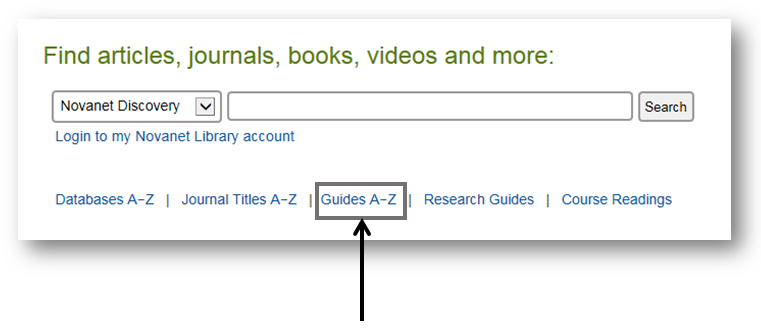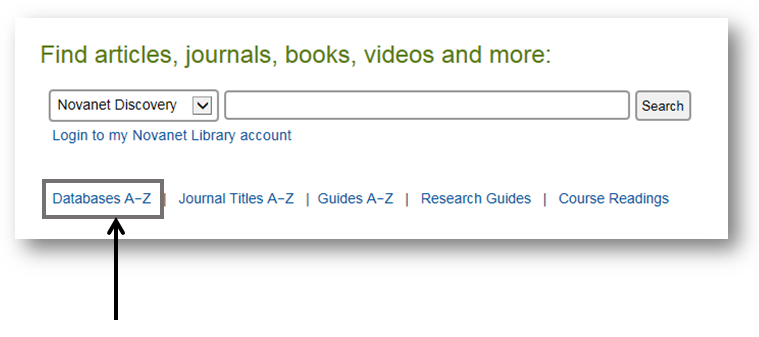
Library databases can be accessed through the library’s LibGuides or through the databases A-Z list.
Databases are subscription-based, and may be either multidisciplinary (e.g. Academic Search Premier) or subject-specific (e.g. PsycINFO).
Databases collect articles from various academic journals and allow you to search them all in one place, rather than browsing journals separately.
Mostly articles from academic journals.
Some databases will include non-academic resources, like trade magazines and corporate reports.
Other databases are specifically for primary source material.
Good for discipline-specific searching – can use a subject database to eliminate irrelevant results.
Many instructors will request scholarly journals for assignments. Databases are the best places to find these.
Knowing the difference between a database and a search engine is an important search basic. This clip from the Wellington Medical & Health Sciences Library, explains the differences and when to use each tool.
Wellington Medical & Health Sciences Library. [WMHSLibrary]. (2010, November 3). Library databases vs search engines [Video file]. Retrieved from https://www.youtube.com/watch?v=Oa9Plg_7gdg
The links Guides A-Z and Databases A-Z are located under the Novanet Discovery search box. Both are routes to finding the library databases

Not sure which article database to use for your topic?
 Database A-Z
Database A-ZAre you familiar with the names of the article databases you need?
Optional: View only article databases
Optional: View subjects
 Using AND
Using AND Using OR
Using OR

Try these interactive tutorials from Colorado State University Libraries:
Thanks to Colorado State University for sharing their tutorials
Click on the "next" button to begin.
Boolean Searching (Basic)
Colorado State University (n.d.) Boolean searching [Interactive tutorial]. Retrieved from http://lib.colostate.edu/tutorials/
Thanks to Colorado State University for sharing their tutorials
Click on the "next" button to begin.
Truncation
Colorado State University (n.d.) Truncation [Interactive tutorial]. Retrieved from http://lib.colostate.edu/tutorials/


Most of us are already familiar with results page from online shopping. Database results pages have a lot of familiar features
As you can see from the screen shots of results in EBSCO Academic Search Premier and ProQuest Research Library, these options are present but appear in different parts of the page.


Most databases offer an advanced search screen that allows you to easily set the search filters at the beginning of your search session.
The most frequently used filters are:
When you activate a filter you may exclude results that are relevant to your topic
Proceed with caution when using the following options:


Subject headings are an established set of word or phrases that are used to describe or classify articles in a database.
Unlike keywords which are a match made by the computer between what you entered and what exists in the item records (authors, titles, abstracts, etc.), the subject headings are applied by staff employed by the database companies. The subject headings represent the main essence of the articles.
Example
Broadest term:
communication to represent all types of communication.
Narrower term:
Social media is a narrower term related to communication within online communities. This is narrower than communication, but still encompasses many types of online networks and communication.
Narrowest term:
Finally you can have narrower subjects headings such as blogs, which concerns itself with one type of social media.
This is an advantage because depending on your topic and what items are available, you may need to make your search narrower or broader. The Subject Headings structure provides some guidance on the terms to use to broaden or narrow your search. It can also provide related terms.
Examples:
GMO or genetically modified seeds (term we may want to use)
Transgenic seeds (subject term in use)
Gender role (term we may want to use)
Sex role (actual subject term in use)




Explore the database for your subject area.
The 3 most important items to keep track of when you find a good source are:
We all have a system of keeping track of our sources. Please share your system when we meet in Blackboard Collaborate
Most databases allow you to select items to add to a marked list or folder, not unlike a shopping card on an online shopping site.
From this folder you can email yourself or export to RefWorks (or other citation tracking tools), the items you want to keep.
Once in RefWorks you can organize your citations by folders. RefWorks also allows you to add file attachments and notes.
In additions to helping organize and keep track of your research, RefWorks can be used to create your in-text citations and reference lists if you write your paper with Microsoft Word.
Most of the major databases allow item records (and full text if available) to be sent to an email address of your choice. You may add additional notes to this message as described above. If the database does not have an internal email option, you can do this manually with your own email account. However, be sure to use the article's permalink or stable URL when recording the link the article. The URL you copy from the Browser internet address bar might be a temporary address. The permalink or stable URL will last. If you are not sure where to find the permalink, instructions can be found on the Mount's Databases A-Z link under each database.
Major database companies like EBSCO and ProQuest allow you to create user accounts on their databases. These accounts allow you to keep track of the articles within that company's databases (but alas not the items you find from other sources). Caution: You must also remember to sign in with your EBSCO or ProQuest login every time you conduct research on their database or you might lose your work.